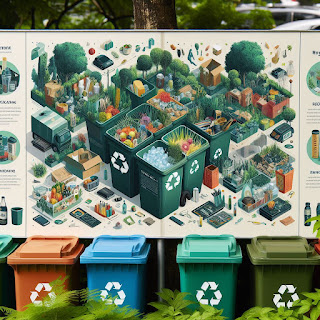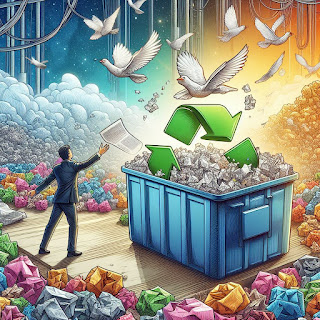The Necessity of Purchasing Recycling Products to Contribute to Preserving the Environment: A Comprehensive Guide
Introduction
Understanding the importance of recycling in preserving the environment and supporting a green future is crucial. It not only helps to reduce waste but also fosters sustainable practices that benefit both the planet and the economy. Recycling is not just a responsible choice; it is also an economically viable option that can positively impact our lives and the world we live in.
I. Waste paper recycling
1. Paper recycling methods
When it comes to paper recycling, various methods can ensure efficient and sustainable processes. Stimulating the purchase of products made from recycled paper is one such method. Opting for items like notebooks, printer paper, and stationery made from recycled paper actively contributes to reducing the demand for virgin pulp.
Pulping and deinking of waste paper are essential steps in obtaining high-quality products. This process breaks down the fibers of waste paper, resulting in pulp used to create new paper products. Deinking removes ink and unwanted materials, ensuring the quality of the final recycled paper.
Grinding and reprocessing paper is another vital technique in paper recycling. This process involves shredding and grinding waste paper into small fibers mixed with other materials to create new products. Reprocessing paper conserves valuable resources and reduces environmental strain.
2. Advantages of paper recycling
Choosing recycled paper products actively contributes to preserving forest resources, as sustainable paper manufacturing relies heavily on recycling. This reduces the need to cut down trees, protecting precious forests. Paper recycling also reduces energy consumption, waste, and greenhouse gas emissions compared to producing paper from raw materials.
3. Paper shredder: an effective solution for environmental protection
https://s.click.aliexpress.com/e/_DmIH0Zr
A paper shredder is a necessary device in offices and businesses for many reasons, beyond destroying documents. This machine plays an effective role in protecting the environment by promoting paper recycling. Instead of unsustainably disposing of documents, the shredder converts them into strips or small particles, contributing to efficient material recycling.
Moreover, using a shredder protects sensitive data and personal information, preventing identity theft by destroying documents in a way that their content cannot be recovered. In short, purchasing a paper shredder is a smart decision as it not only protects data but also supports resource recycling efforts and sustainable development.
II Plastic waste recycling
1. Plastic recycling methods
Plastic recycling plays a vital role in combating plastic pollution and promoting a sustainable future. Supporting the use of recycled plastic products is one way to contribute. Purchasing items made from recycled plastic, such as bottles, bags, and containers, helps reduce the demand for new plastic and encourages a circular economy.
Melting and reprocessing plastic waste is another method employed in plastic recycling. By melting down plastic waste, it can be molded into new products, reducing the amount of plastic in landfills and oceans. Plastic pelletizing and manufacturing processes improve the overall life cycle of plastic products, making them more sustainable.
2. Benefits of plastic recycling
Plastic recycling offers numerous benefits in terms of environmental sustainability. By reducing plastic pollution, we can actively contribute to the health of our oceans, protecting marine life and ecosystems. Plastic recycling also conserves energy and reduces carbon dioxide emissions, contributing to the fight against climate change.
Moreover, plastic recycling promotes innovation in the plastics industry, encouraging the development of new and sustainable materials, leading to a more environmentally friendly plastic industry.
3. ECHOME 15L: Smart induction trash can
https://s.click.aliexpress.com/e/_DFZfWdr
The new ECHOME 15L trash can is an innovative solution for a modern and sustainable kitchen. This smart container facilitates waste sorting at home with automatic classification of dry and wet waste.
Distinguished by its 15-liter capacity and smart design, the ECHOME 15L allows one-touch opening and closing control. Its advanced functions control odor, keeping your kitchen clean and organized.
By purchasing the ECHOME 15L, you not only gain a high-quality kitchen product but also contribute to environmental protection. Correct waste sorting and recycling promote a sustainable lifestyle, reducing the environmental impact of waste and promoting resource reuse.
III.It is necessary to buy food stores to preserve food for a longer period
Smart food pantries are a necessity for every home looking to preserve their food longer and get the most out of it. In this context, the “4 Piece Folding Silicone Dinnerware Set” stands out as an ideal solution to this need. These portable and practical containers offer many advantages.
The flexible and durable silicone design allows these containers to adapt to different amounts of food and be folded to save storage space. This makes them perfect for both home and outdoor trips.
These containers are microwavable, making reheating easy and efficient. Additionally, they can be used to store food in the refrigerator or freezer, maintaining the quality of the food and extending its shelf life.
By providing these versatile containers, purchasing them contributes to reducing food waste and improving storage organization at home. Therefore, having the “4 Piece Silicone Folding Utensils” is a sustainable and practical option for everyone who cares about maintaining the quality and shelf life of their food.
IV.Organic waste recycling
1. Methods of recycling organic waste
Using organic waste recycling is crucial for promoting sustainable agriculture and reducing dependence on harmful chemical fertilizers. The use of organic products, such as compost and vermicompost, can enrich the soil and improve its fertility, supporting the growth of healthy crops while preserving
Natural Resources.
Composting and aerobic decomposition are valuable methods for converting organic waste into natural fertilizer. These processes involve the controlled decomposition of organic materials, resulting in nutrient-rich compost that can be used in agriculture and gardening. Anaerobic digestion and biogas production utilize organic waste to generate alternative energy sources, reducing our reliance on non-renewable fuels.
2.Stainless Steel Kitchen Garbage Cans: A Masterpiece of Style and Efficiency in Waste Management
Conclusion
The role of recycling in achieving sustainable environmental practices cannot be overstated. It is not only necessary but also our ethical responsibility to contribute to preserving the environment. By choosing to purchase recycling products, we actively support a greener future and reduce our environmental footprint. Every individual's participation and awareness of the impact of their choices on the environment and the economy are essential for a successful and sustainable recycling system.
Frequently Asked Questions:
1. Does recycling make a real difference to the environment?
Yes, recycling makes a significant difference to the environment. By recycling waste materials instead of sending them to landfills or incineration plants, we can conserve natural resources, reduce pollution, save energy, and mitigate climate change. Recycling contributes to a circular economy, where materials are reused, reducing the need for resource extraction and minimizing waste.
2. **Are there any materials that cannot be recycled?
While most materials can be recycled to some extent, certain materials pose challenges in the recycling process. For example, some plastic types, like PVC (polyvinyl chloride), can release toxic chemicals during recycling. Additionally, heavily contaminated or mixed materials, such as food-soiled paper or plastic-coated paper, can be difficult to recycle efficiently. However, ongoing research and advancements in recycling technologies aim to overcome these limitations and expand the range of recyclable materials.
Recycling is a powerful tool in combating environmental degradation and promoting a sustainable future. By purchasing recycling products and actively participating in recycling initiatives, we can contribute to preserving the environment, conserving resources, and building a healthier and greener world for generations to come.









0 Comments